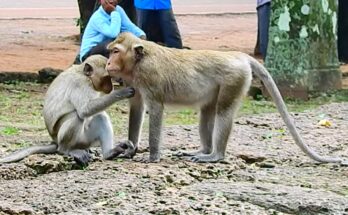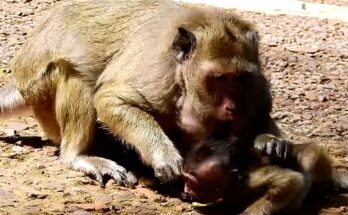In the quiet shade of the forest canopy, an exhausted mother monkey moved slowly along a sturdy branch, her limbs heavy from a long day of searching for food, watching for danger, and keeping her young one safe. Her baby, still tiny and full of need, clung tightly to her chest, wrapping its small arms around her neck as though it feared the world beyond her fur. Every movement she made was careful and measured, not only to keep herself balanced, but also to avoid disturbing the little one that refused to let go.
Although mothers in the wild are known for their patience, today her fatigue was impossible to hide. Her eyes—usually alert and bright—drooped with weariness, and her breaths came slow and labored. She shifted her body, trying gently to create space, hoping the baby might settle beside her instead of on her. But the young monkey only pressed closer, squirming anxiously and tightening its grip. It wanted warmth, comfort, and constant reassurance, and it knew only one place to find them.
The mother let out a soft grunt, a small sound of frustration and strain. Caring for her baby was instinct, duty, and love all at once, yet even the most devoted mothers reach a moment where exhaustion overtakes patience. She scratched at her fur and blinked heavily, glancing around at the other monkeys resting nearby. Some groomed each other peacefully; others lounged freely, their young already playing independently.
Still, despite her tiredness and the weight clutching onto her, she did not push the baby away. With a deep breath, she settled herself again, wrapping her arm securely around her little one. Frustration faded into acceptance, and fatigue blended with the quiet, powerful bond only a mother can hold.


